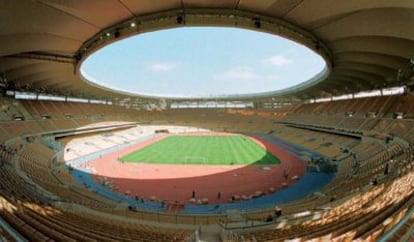Solving the problem of Seville's great Olympic 'poyaque'
Stadium built for city's failed 2004 Games bid has eaten up taxpayers' cash
The failure of Seville's Olympic Stadium is the story of a "poyaque." If you do not move in certain Andalusian circles, the expression may not be a familiar one. But you will soon understand what it means.
The stadium was inaugurated in 1999 to make Seville a candidate to host the 2004 Olympic Games ? which were eventually won by Athens, Greece. Alejandro Rojas-Marcos, then the city's mayor, was convinced that Seville could beat out the other Spanish candidate, Madrid. Twenty billion pesetas (120 million euros) were invested in a structure built to seat 60,000 spectators, three times more than the Olympic Stadium constructed in Madrid five years earlier (which cost three times less to build).
After both cities were ruled out, the stadiums became something akin to giant Chinese vases stuck in the ground on the outskirts of town, and nobody knew quite what to do with them.
"I don't want to go into whether this should have been built or not," explains Manuel Zafra, managing director of the Seville stadium, known as the Estadio Olímpico de La Cartuja. "But what do we do with it now? Do we seal the doors and fill it up with water to turn it into a pond? This became a 'poyaque': everyone who walked in would contribute ideas with a 'po ya que estamos aquí hacemos esto' [an Andalusian version of 'pues ya que estamos aquí hacemos esto' or 'since we're stuck with this, we might as well do this or that']."
And in the end, says Zafra, it was taxpayers who paid for all of it.
The year it was inaugurated, 1999, the stadium hosted the World Athletics Championships. In 2003, La Cartuja was the site of the UEFA Cup Final; in 2004 the Davis Cup final was held there, and there have also been two King's Cup soccer finals at the stadium. In December of this year, La Cartuja will again host the Davis Cup final, to be played between Spain and Argentina. But the truth is that during the last 12 years, major sports events have been the exception rather than the norm.
On a recent Thursday, the only people to be seen inside the stadium were around 20 Asian movie extras who pretended to closely watch a thoroughbred going over some jumps below. La Cartuja had morphed into the set of a film about a horse that participated in the Seoul Olympic Games of 1988. And just as the movie's director will have to find a way to turn 20 spectators into a roaring crowd, so Manuel Zafra will have to find a way to make the numbers work in a city that has turned its back on the stadium.
The facilities belong to a society whose stakeholders are the Andalusian regional government (35 percent), the central government (30 percent), the City of Seville (17 percent), the provincial authority (15 percent) and a few other minor partners such as the Betis and Seville soccer clubs. The orders Zafra received from them when he was appointed to the post in 2007 were very precise: "They told me the main goal was for this to stop costing people any more money. We have 200,000 square meters of built land and every year I have to pay 490,000 euros in property tax. And all sports competitions, save for soccer, cost money. [...] When I got here, there was a staff of 20, and now there are nine of us. I externalized several services because keeping this open costs a lot of money. In 2005 the stadium was posting losses of half a million euros, and last year we had nearly 600,000 euros in profit."
Now, Zafra tries to host all types of events, from concerts by Madonna, Bruce Springsteen and U2 to a nun's beatification and a Jehovah's Witnesses assembly. But 75 percent of revenues comes from the rent paid by the tenants who occupy the office space in the four towers. Half of them, however, are public agencies, meaning that taxpayers are putting up the money to occupy the building whose construction they also funded.

Tu suscripción se está usando en otro dispositivo
¿Quieres añadir otro usuario a tu suscripción?
Si continúas leyendo en este dispositivo, no se podrá leer en el otro.
FlechaTu suscripción se está usando en otro dispositivo y solo puedes acceder a EL PAÍS desde un dispositivo a la vez.
Si quieres compartir tu cuenta, cambia tu suscripción a la modalidad Premium, así podrás añadir otro usuario. Cada uno accederá con su propia cuenta de email, lo que os permitirá personalizar vuestra experiencia en EL PAÍS.
¿Tienes una suscripción de empresa? Accede aquí para contratar más cuentas.
En el caso de no saber quién está usando tu cuenta, te recomendamos cambiar tu contraseña aquí.
Si decides continuar compartiendo tu cuenta, este mensaje se mostrará en tu dispositivo y en el de la otra persona que está usando tu cuenta de forma indefinida, afectando a tu experiencia de lectura. Puedes consultar aquí los términos y condiciones de la suscripción digital.








































